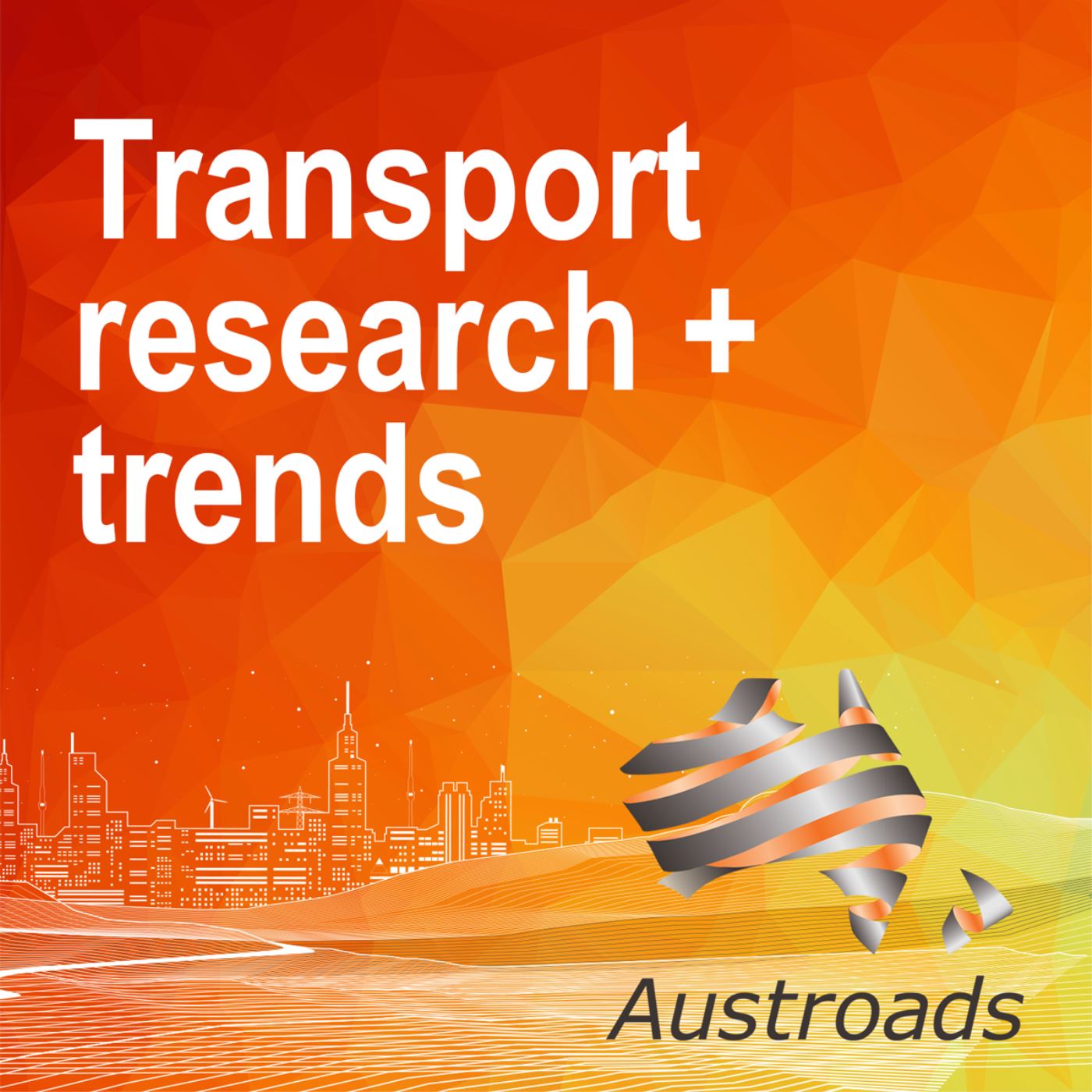Episodes
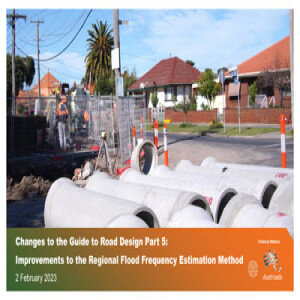
Thursday Feb 02, 2023
Thursday Feb 02, 2023
In response to feedback provided by industry and stakeholders, Austroads has reviewed its Guide to Road Design Part 5: Drainage – General and Hydrology Considerations.
The improved guidance responds to the implications for road authority and consulting engineering practices arising from the 2019 update of the Australian Rainfall and Runoff document.
This is the second webinar in a two-webinar series, and it covers the improvements made to the Regional Flood Frequency Estimation (RFFE) method.
The following is discussed in the session:
- Background to the RFFE method
- Recent improvements to the RFFE method
- Worked examples
- Limitations of RFFE and how to assess the quality of the answers produced
The webinar is presented by WMAwater’s Managing Director Mark Babister and William Weeks, currently a private consultant and former Director - Hydraulics and Flooding for the Queensland Department of Transport and Main Roads.
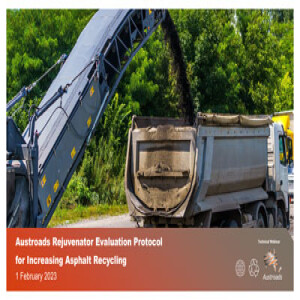
Wednesday Feb 01, 2023
Austroads Rejuvenator Evaluation Protocol for Increasing Asphalt Recycling
Wednesday Feb 01, 2023
Wednesday Feb 01, 2023
The use of reclaimed asphalt pavement (RAP) in new asphalt mixes is a common practice in Australia and New Zealand due to its many benefits. RAP contents are typically about 10–20% but higher contents can be used, if the effect of the aged binders present in RAP is accounted for. Rejuvenators can be used to soften the hardened binders which are present in RAP, and are therefore considered an essential component for producing high-content RAP mixes.
Although Australian and New Zealand asphalt producers acknowledge the importance of rejuvenators (in particular when producing high RAP mixes), rejuvenators are not commonly used due to the lack of specifications/guidelines that can evaluate the potential performance of rejuvenators when used in RAP mixes. To address this issue, Austroads has developed a rejuvenator evaluation protocol. In this protocol, rejuvenators are evaluated as part of binder blends, and their short/long-term ageing resistance is assessed to ensure their performance at the production stage as well as during service in the long term.
This webinar with Young Choi, Robert Busuttil and Robert Urquhart presents the proposed protocol and its development work. The development work involved a literature review into international rejuvenator specifications and research studies, in particular those which investigated the effect of rejuvenator properties on the properties/ performance of asphalt binders and mixes.
The development work involved obtaining feedback from Austroads technical group members and international experts. These studies were conducted to ensure that the evaluation protocol is robust and practical.
The webinar also covers a plan for future validation studies which will ensure that the protocol is suitable for use in Australia and New Zealand.
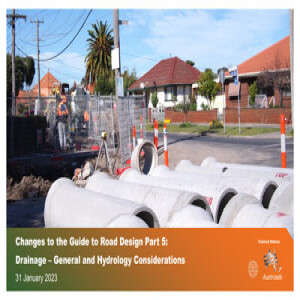
Tuesday Jan 31, 2023
Tuesday Jan 31, 2023
In response to feedback provided by industry and stakeholders, Austroads has reviewed its Guide to Road Design Part 5: Drainage – General and Hydrology Considerations.
The improved guidance responds to the implications for road authority and consulting engineering practices arising from the 2019 update of the Australian Rainfall and Runoff document.
This webinar is the first in a two-webinar series and it provides an update on the changes to the Austroads Guide to Road Design Part 5. The session focuses on Section 6 and covers the other changes. The following is covered in the session:
- Change in terminology – from average recurrence interval (ARI) to annual exceedance probability (AEP)
- Why Rational Method is no longer suitable for most cross-drainage applications
- What Rational Method is suited for (primarily longitudinal road drainage)
- An introduction to alternative flow estimation techniques (incl. regional flood frequency estimation (RFFE))
- Rare and extreme events
- Flood impacts/tunnel portals
- Safety in design
- Joint probability and uncertainty
The webinar is presented by WMAwater’s Managing Director Mark Babister and William Weeks, currently a private consultant and former Director – Hydraulics and Flooding for the Queensland Department of Transport and Main Roads.
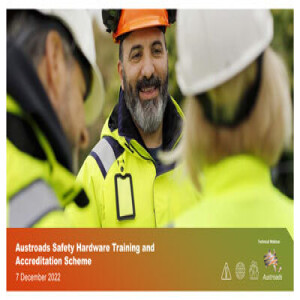
Wednesday Dec 07, 2022
Austroads Safety Hardware Training and Accreditation Scheme
Wednesday Dec 07, 2022
Wednesday Dec 07, 2022
Road safety barriers are a critical component of a safe road transport system and are saving lives and preventing serious injuries every day across Australian and New Zealand roads. To ensure they deliver their intended safety outcomes and manage the extreme forces involved in high-speed crashes, barriers must be correctly installed and maintained.
This webinar with Michael Nieuwesteeg and Chris Koniditsiotis from Austroads, Robert Tabor and Stephanie Craig from Lantra, Jade Hogan from Transport for NSW and Evan Coulson from the Department of Transport Victoria presents the Austroads Safety Hardware Training and Accreditation Scheme (ASHTAS), which delivers a high standard and nationally consistent set of training outcomes for individuals installing and maintaining road safety barriers in Australia and New Zealand.
ASHTAS responds to Austroads members, along with the road safety barrier industry, who have been concerned about the quality of installation of road safety barriers which may put the safety of the public and road workers at risk.
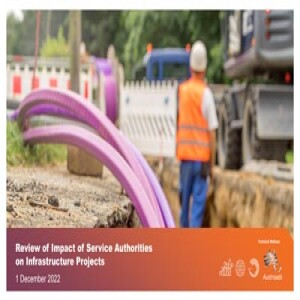
Thursday Dec 01, 2022
Review of Impact of Service Authorities on Infrastructure Projects
Thursday Dec 01, 2022
Thursday Dec 01, 2022
Austroads is undertaking a multi-stage project to support road transport and traffic agencies across Australia to manage the impacts of third-party assets on the successful delivery of road infrastructure projects, including road projects with a rail interface. To form an effective, evidence-based strategy and action plan, the project included international literature research, jurisdictional consultation and four road infrastructure project case studies.
This webinar with Robert Eames, Nicola Boyd, David Bourne and Maria Drysdale presents the research findings and where change is required to improve the efficient delivery of major infrastructure projects when third-party assets are involved. One key element proposed is a national minimum dataset of information to monitor third-party impacts on road infrastructure projects.
The collection and reporting of high-quality data is essential but depends on stakeholders sharing cost information so that value-based decisions can be made across the whole project. Measurement of costs associated with utilities on projects will permit analysis of past events which will lead to two beneficial outcomes:
- Understanding events and determining patterns will enable predictions of the future to be made.
- Quantitative evaluation of past project events will allow plans for improvement to be developed.
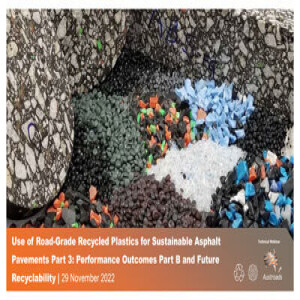
Tuesday Nov 29, 2022
Tuesday Nov 29, 2022
Austroads has completed its project APT6305 Use of Road-grade Recycled Plastics for Sustainable Asphalt Pavements which was investigating road-grade recycled plastics that can be used to construct and maintain asphalt roads.
The project results are provided in four reports:
The first report examined the use of road-grade recycled plastics in asphalt pavements and investigated the most suitable types of recycled plastics for incorporation into asphalt.
The second report provided a comprehensive overview of the development of various testing frameworks for the characterisation of road-grade recycled plastic, the incorporation of recycled plastics in bitumen and asphalt and the study of possible emissions and microplastics release.
Report 3 Part A presented the results of the experimental investigation on recycled plastics in asphalt and bitumen by focusing on the asphalt and bitumen properties, microplastics and emissions. The report focused on the wet and dry method of incorporation of plastics into asphalt.
This 75-minute webinar focuses on Part B of the third report outlining the mixed methods (i.e., low melting point plastics as additive to modify asphalt) performance and environmental assessment and expanding on the recyclability of reclaimed plastic-modified asphalt.
The webinar was presented by Andrew Papacostas from Department of Transport Victoria, Associate Professor Filippo Giustozzi from RMIT University and his team, including Dr Marie Enfrin, Yeong Jia Boom, and Dr Dai Lu Xuan.

Tuesday Nov 15, 2022
Best Practice in Smart Motorways Operations
Tuesday Nov 15, 2022
Tuesday Nov 15, 2022
The operation of smart motorways is a subset of broader transport operations and relies on complex organisational arrangements with highly specialised capabilities to manage a growing number of assets, follow a wide range of operational scenarios, coordinate with multiple stakeholders, and continuously adapt to new technologies and systems. This increasing complexity places pressure on traffic management centre (TMC) managers and their operational staff who are responsible for delivering motorway safety and efficiency objectives.
As such transport agencies continually seek to improve the way smart motorways operational capabilities are managed, developed and adapted to minimise disruption for customers through best practice operational planning, project integration, live network monitoring, traveller communications and traffic management.
In response Austroads has prepared a research report looking into emerging and new trends to inform potential future directions for TMCs across Australia and New Zealand. Guidelines have also been developed for road-focused agencies to help classify their operating characteristics, define a national capability framework for the operational environment, and showcase good practice integration of new projects and enhanced smart motorways schemes.
This webinar, presented by David Yee, Simon Gough and Joanne Deng, provides an overview of the future trends, research findings and agency guidance. The research into future trends helped to identify different motorway operational methods and practices as well as operational principles that underpin an agency’s smart motorway capabilities. These smart motorway capabilities include TMC business management, live motorway operations, motorway operational planning and optimisation, motorway projects integration as well as use of intelligence tools and devices to inform decision making.
The webinar also offers advice on how to support improving smart motorway capabilities using a Smart Motorway Classification Model and Capability Framework. The capabilities are the foundational abilities that should be developed. The Capability Maturity Model is a maturity scale for smart motorway capabilities that can be used by agencies to set future targets and to measure against. The guidance advises how to use the Capability Maturity Model to plan and improve smart motorway capabilities and projects integration work.
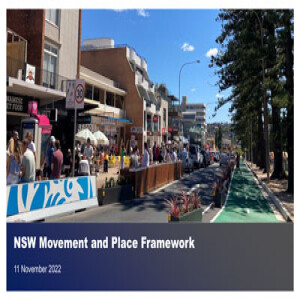
Friday Nov 11, 2022
NSW Movement and Place Framework
Friday Nov 11, 2022
Friday Nov 11, 2022
Movement and Place is a multi-disciplinary, place-based approach to the planning, design, delivery and operation of transport networks. It broadens our thinking about our roads and streets beyond their functional role in supporting movement - they are also places for people to live, work and spend time.
It is part of an international shift towards embracing the importance of people, and place when designing, planning or operating streets and roads. It recognises the complementary relationships between place and movement and matching the road or street to its desired function within the wider network.
This webinar, presented by Arjan Rensen, Ben Cebuliak and Gareth Collins, provides an overview of the whole-of-government NSW Movement and Place Framework and how it supports Austroads Guidance, Australian Standards and the Global Street Design Guidelines as they apply in different contexts across NSW. The Framework invites practitioners to take collaborative, spatial and vision-led approaches and offers a common language and process of collaboration to support meaningful discussions across all levels of government, industry, and communities.
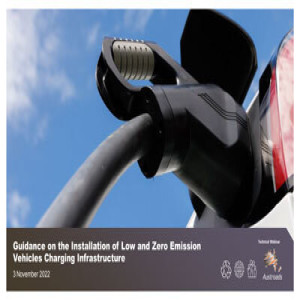
Thursday Nov 03, 2022
Thursday Nov 03, 2022
Internal combustion engine vehicles are a major source of greenhouse gas emissions in Australia and New Zealand. Encouraging the public to utilise low and zero emission vehicles (LZEVs), such as battery electric vehicles will contribute to creating a more sustainable road transport system.
As the number of LZEVs is expected to rise, there will be a growing demand for charging infrastructure. Increasing availability of such infrastructure will also encourage the uptake of LZEVs; however, currently there is little guidance available to road agencies to assist them in managing the installation of charging infrastructure within road reserves.
This webinar with David Silvester and Norman Cheung presents new Austroads guidance to help agencies manage the planning, installation, and operation of charging infrastructure for non-commercial passenger vehicles with battery-electric or hybrid propulsion within the road reserve or road related areas.
The guidelines draw on the latest international and national experience and case studies and can be used by agencies in the implementation of consistent charging facility practices to reduce costs, improve the road environment, road safety, network operations, and LZEV driver experience.
The webinar covers guidance on managing the life cycle of the facilities, including planning, design, operations, interoperability, maintenance, and decommissioning.
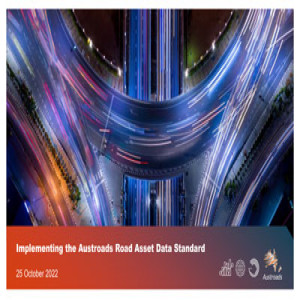
Tuesday Oct 25, 2022
Implementing the Austroads Road Asset Data Standard
Tuesday Oct 25, 2022
Tuesday Oct 25, 2022
To enable collaboration and the adoption of best-practice approaches across jurisdictions, Austroads is undertaking a multi-stage project to standardise and automate ways of recording and sharing road asset information.
The benefits of standardised collection of road asset data and the availability of a platform to store or exchange data include:
- direct savings to road agencies through reduced information management costs, including the opportunity to sustain an open and competitive market of data collectors
- reducing the time needed to train new staff and contractors
- facilitating better decision making on road investment and expenditure through consistent asset data
- facilitating the implementation of national reforms, including Heavy Vehicle Road Reform and automated vehicle reform
- providing consistent asset data to accommodate innovative technology in the road sector (e.g., LIDAR technology, building information modelling (BIM), and digital twinning).
This webinar, presented by Chris Koniditsiotis, Angus Draheim, Tom Magarey, David Deacon and Geoffrey Paton, presents an overview of the implementation of the Austroads Road Asset Data Standard and demonstrates a knowledge sharing platform that is being developed for road managers to use to report activities, collaborate and share insights.

